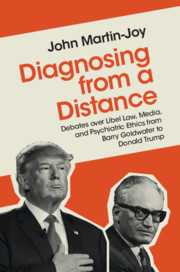 Diagnosing from a Distance
Diagnosing from a Distance from Part II - Professionalization and the Rise of the Goldwater Rule
Published online by Cambridge University Press: 29 February 2020
This chapter reviews the material presented in this book, including the history of novel legal doctrines; the use of libel law for political purposes; the interrelationship between politicians, media, and political followers; and the recurring debates over the ethics of comment from a distance. Goldwater was so far ahead of his time in understanding the political value of lawsuits that he anticipated the conservative legal movement of the 1980s. I then propose an alternative approach to the Goldwater Rule, drawing on the work of philosophers James Madison, John Rawls, Jacques Mauritain, and Martha Nussbaum to argue for a more liberal and tolerant guideline for psychiatric comment on public figures. The APsaA, in response to the Fact episode of 1964, adopted such a guideline under President Heinz Kohut. The result was a respectful and ethically coherent stance that has stood the test of time. Instead of banning comment outright as the APA’s Goldwater Rule does – a form of coercive paternalism in the sense described by philosopher Sarah Conley and others – I argue that the psychiatric community should respect the conscience of the individual psychiatrist acting in good faith.
To save this book to your Kindle, first ensure [email protected] is added to your Approved Personal Document E-mail List under your Personal Document Settings on the Manage Your Content and Devices page of your Amazon account. Then enter the ‘name’ part of your Kindle email address below. Find out more about saving to your Kindle.
Note you can select to save to either the @free.kindle.com or @kindle.com variations. ‘@free.kindle.com’ emails are free but can only be saved to your device when it is connected to wi-fi. ‘@kindle.com’ emails can be delivered even when you are not connected to wi-fi, but note that service fees apply.
Find out more about the Kindle Personal Document Service.
To save content items to your account, please confirm that you agree to abide by our usage policies. If this is the first time you use this feature, you will be asked to authorise Cambridge Core to connect with your account. Find out more about saving content to Dropbox.
To save content items to your account, please confirm that you agree to abide by our usage policies. If this is the first time you use this feature, you will be asked to authorise Cambridge Core to connect with your account. Find out more about saving content to Google Drive.